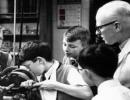What kind of love does General Anosov dream of? A. I. Kuprin. Garnet bracelet. Text of the work. VIII. The history of the creation of the story “Garnet Bracelet”
Anosov was a military general who became a friend of the Tuganovsky family a long time ago. He was appointed commandant of the fortress, and from then on he became friends with the father of Anna and Vera, and became attached to the girls, like a father. He was a real Russian man, a soldier to the core, honest, noble and brave. Despite the fact that he rose to the rank of general, he always behaved with everyone on an equal footing and respected soldiers as much as officers. He never acted dishonestly, he was always guided by his conscience in everything, but he did it in such a way that everyone respected him and considered him a worthwhile person. He was not afraid to fight, and went through several wars, participated in many battles, but when he was not called to another war, he did not ask, because he believed that you should not be a coward, but if you are not called to death, it is better not walk.
He always tried to act honestly and fairly, so he paid his estranged wife an allowance for the rest of his life, since he believed that he must fulfill his duties as a husband no matter what. But he did not want to let her back in, although she really asked, because he was proud and had self-esteem. He did not want to live with an unloved, dishonest wife whom he did not trust. But, despite this, he did not leave her to the mercy of fate, but acted like a real man. General Anosov was a very good storyteller and loved children very much. Since he did not have his own children, he transferred all his paternal feelings to the children of his friend, Anna and Vera, he played with them, told them stories from his military life, full of campaigns. They reciprocated his feelings. He has the same paternal attitude towards everyone who is younger than him and who needs help. For example, he ordered lunch to be carried from his table for those who did not have the opportunity to eat normally in the fortress of which he was the commandant.
L. van Beethoven. 2 Son. (op. 2, no. 2).
Largo Appassionato
I
In mid-August, before the birth of the new month, disgusting weather suddenly set in, such as is so typical of the northern coast of the Black Sea. Then, for whole days, a thick fog lay heavily over the land and sea, and then the huge siren at the lighthouse roared day and night, like a mad bull. From morning to morning there was a continuous rain, fine as water dust, turning the clay roads and paths into solid thick mud, in which carts and carriages got stuck for a long time. Then a fierce hurricane blew from the northwest, from the direction of the steppe; from it, the tops of the trees swayed, bending and straightening up, like waves in a storm, the iron roofs of the dachas rattled at night, and it seemed as if someone was running on them in shod boots, window frames trembled, doors slammed, and there was a wild howl in the chimneys. Several fishing boats got lost at sea, and two never returned: only a week later the corpses of fishermen were thrown up in different places on the shore. The inhabitants of the suburban seaside resort - mostly Greeks and Jews, life-loving and suspicious, like all southerners - hastily moved to the city. Along the softened highway, drays stretched endlessly, overloaded with all sorts of household items: mattresses, sofas, chests, chairs, washbasins, samovars. It was pitiful, sad, and disgusting to look through the muddy muslin of the rain at this pitiful belongings, which seemed so worn out, dirty and miserable; at the maids and cooks sitting on top of the cart on a wet tarpaulin with some irons, tins and baskets in their hands, at the sweaty, exhausted horses, which stopped every now and then, trembling at the knees, smoking and often skidding on their sides, at the hoarsely cursing tramps, wrapped from the rain in matting. It was even sadder to see abandoned dachas with their sudden spaciousness, emptiness and bareness, with mutilated flowerbeds, broken glass, abandoned dogs and all sorts of dacha rubbish from cigarette butts, pieces of paper, shards, boxes and apothecary bottles. But by the beginning of September the weather suddenly changed dramatically and completely unexpectedly. Quiet, cloudless days immediately arrived, so clear, sunny and warm, which were not there even in July. On the dried, compressed fields, on their prickly yellow stubble, an autumn cobweb glistened with a mica sheen. The calmed trees silently and obediently dropped their yellow leaves. Princess Vera Nikolaevna Sheina, the wife of the leader of the nobility, could not leave the dacha because the renovations in their city house had not yet been completed. And now she was very happy about the wonderful days that had come, the silence, solitude, clean air, the chirping of the swallows on the telegraph wires as they flocked to take off, and the gentle salty breeze blowing weakly from the sea.General Yakov Mikhailovich Anosov in Alexander Kuprin’s story “The Garnet Bracelet” characterizes the adult generation, which is able to guide youth along the right path, along the path of love and fidelity; which will show the truth of life and will not allow you to drown in the deceit of the world around you. General Anosov did not find his place in a happy family life: his wife left him for a visiting artist. Yakov Mikhailovich is a military comrade of the father of the main characters.
The main characters of the work are Vera Nikolaevna and Anna Nikolaevna. Vera is married to a landowner. And their family is happy at first glance, but behind the veil of this calm lies lost feelings. Vera has not loved her husband Vasily Lvovich for a long time, all ardent emotions have cooled down, only friendship and devotion remain.
Anna married a very wealthy, but also contented, stupid man. She initially did not love him, but nevertheless bore him two children. She did not want to give birth again and despised her husband in every possible way, condemning him behind his back and to his face. Anna is the goddaughter of General Amosov.
One evening, a party takes place in the house of Vera Nikolaevna and her husband. Everyone present behaves unworthily: one military man is dancing, the men are sitting at a card table. In this situation, it became known about the failed wedding of Vera Nikolaevna’s brother and Anna Nikolaevna, and that for several years in a row some abnormal person had been sending love messages to Vera without demanding an answer. And it becomes clear that the highest authorities do not understand such a strong and beautiful feeling as love.
And it is Anosov who understands where the moral component of this society has slipped. He sees that young people no longer know how to love. For them, this is a frivolous word that can be thrown around in different directions without going into the true meaning of this word. He also notes that the institution of marriage has been destroyed: people get married for material reasons or out of momentary desire, without thinking about how they will live in the future. The general condemns those gathered; warns that they are on the border of immorality, and that a little more and the feeling of love will leave them forever.
Yakov Mikhailovich himself has never met pure and bright love in his life, but he continues to believe in it and believes that such love is rare, but it deserves to be found among honest, open people. He assures Vera Nikolaevna of this, and makes her think about the mysterious admirer and that this is perhaps exactly the love that all women dream of.
Option 2
This old sick man, the godfather of the Tuganovsky princesses, at first glance is funny and absurd. He always walks with a stick in one hand and an ear tube in the other. Despite the fact that he was the commandant of the fortress, he always walked around in civilian clothes, without weapons, often accompanied by two equally old and short of breath pugs. He was well known and loved in the city for his kind attitude towards people. Usually, when entering the guardhouse, he tried to support the arrested, often ordering better food for them. He also said goodbye to loud comments in opera, of which Anosov was a big fan. Anosov was once married, but his wife ran away from him with a passing actor. Since then, he gave all his love and tenderness to the daughters of his fighting friend - the girls Vera and Anya. He gave them gifts, took them to the circus and the theater, and played with them for a long time. But most of all, the girls liked the stories about his past - about wars and peaceful adventures. Anosov entertained them with these stories on long winter evenings in the princely drawing room.
And he had something to talk about. Anosov participated in all military operations of that time, except for the Japanese war, where he was not drafted. Anosov did not shine with education, but thanks to his courage and military skill he rose to the rank of colonel. Skobelev greatly appreciated his courage: “I know one officer braver than myself - this is Major Anosov.” He never punished his subordinates and refused to shoot prisoners. The authorities, seeing his iron conviction, left him alone. This officer kept in himself all the best traits of a Russian warrior: “faith in God, naive and ingenuous, courage, mercy, patience and endurance. And no fear of death, accepting any outcome of the battle. Those traits that make the Russian warrior invincible. He returned from the war almost deaf, with a sore leg and severe rheumatism. But he refused to resign. Then the command fulfilled his request, appointing him for life to the post of commandant of the city - an honorary and not burdensome one.
His goddaughters also asked him about love, an important subject in the thoughts of young girls. Anosov had no doubt that “every woman in love is capable of the highest heroism,” but he was not so sure about men: “Men are to blame, jaded at twenty years old, with chicken bodies and hare souls... And now women are taking revenge ... All because for entire generations we did not know how to bow to love.” He believes that men marry for the convenience of life or for dowry.
True, one day Anosov, a gallant officer, was visited by love. He saw a young Bulgarian woman in Bucharest and fell in love. “Our gazes met, a spark like an electric one ran between us.” After a short time they began dating. However, the life of a soldier does not obey desires - the time has come to leave. The lovers swore eternal love for each other and parted forever. A bright memory remains. That’s why he advises his goddaughters not to pass by high feelings if they encounter them.
Essay about Anosov
In the work “Garnet Bracelet” A.I. Kuprin described love in high society. One of the minor characters in this story is Yakov Mikhailovich Anosov, a general and friend of the Tuganovsky family. The author describes Anosov as a tall and obese man with gray hair. He has a red, rough face, and his eyes are good-natured and radiant, while slightly squinted. The general's appearance inspires trust and sympathy.
Anosov saw a lot on his life's journey, came face to face with danger and death. He was not happy in his personal life; his wife ran away from him even before the war, having fallen in love with someone else. The general considers it his duty to pay this woman an allowance for the rest of his days. However, when she wanted to return to her husband, her sense of pride and self-esteem did not allow her to forgive the betrayal.
The writer portrays Anosov as a real soldier, possessing such human qualities as honesty, courage, nobility. In all his actions, Yakov Mikhailovich is guided exclusively by his own conscience. The general treats ordinary soldiers with the same respect as he treats officers. He has no sense of fear in military battles.
The distinctive features of Yakov Mikhailovich are that he tells different stories superbly, and he also madly loves children. The general enjoys spending time with them and teaching them various tricks.
General Anosov is a man who sees the destruction of moral principles that have existed for years. He worries that such a sublime feeling like love has now turned into something vulgar. The material side is important to young people, but their ability to love sincerely and purely is lost. The general was unlucky in his family life, but he continues to believe in a bright, sincere feeling.
Yakov Mikhailovich Anosov is the embodiment of justice and nobility, a symbol of wisdom, guiding youth on the right path. He is ready to share his life experience and everyday knowledge in the field of relationships between people.
Several interesting essays
- Friendship between Andrei Bolkonsky and Pierre Bezukhov. Composition
L.N. Tolstoy in his novel “War and Peace” places great emphasis on the relationships between people. We see different characters: impulsive, reasonable, loving. But the main role in the work is given to the friendship of Pierre Bezukhov and Andrei Bolkonsky.
- Essay The main idea of the fairy tale Town in Odoevsky's snuffbox
The boy Misha's father gave him a snuff box. He began to tell how everything worked there: bells, hammers, springs.
- Essay How Things Treat Me
I always take care of my property. I always try to carry my things carefully and take care of everything I have.
- Essay Love lyrics by Lermontov, grade 10
The problem of love relationships between a man and a woman is the main theme of the poet’s literary work and occupies more than a third of all works in his literary heritage.
I study at school No. 12. The history of my school begins in the USSR. Then our country was larger, many hospitals, schools and kindergartens were built. The first stone in the construction of the main building was laid in nineteen eighty-three
Russian writer, translator.
Date and place of birth: September 7, 1870, Narovchatsky district, Penza province, Russian Empire.
Kuprin's first literary experience was poetry that remained unpublished. The first published work was the story “The Last Debut” (1889).
In 1910, Kuprin wrote the story “The Garnet Bracelet”. which was based on real events.
"Garnet bracelet"
Heroes
Prince Vasily Lvovich Shein
He is one of the main characters, the husband of Vera Nikolaevna Sheina, and the brother of Lyudmila Lvovna Durasova; prince and provincial leader of the nobility. Vasily Lvovich is highly respected in society. He has a well-established life and an outwardly prosperous family in all respects. In fact, his wife feels nothing but friendly feelings and respect for him. The prince's financial situation also leaves much to be desired. Princess Vera tried with all her might to help Vasily Lvovich avoid complete ruin.
Vera Nikolaevna Sheina
Georgy Stepanovich Zheltkov
Anna Nikolaevna Friesse
Nikolai Nikolaevich Mirza-Bulat-Tuganovsky
General Yakov Mikhailovich Anosov
Lyudmila Lvovna Durasova
Gustav Ivanovich Friesse
Ponamarev
Bakhtinsky
“Garnet Bracelet” summary
Source – I
In September, a small festive dinner was being prepared at the dacha in honor of the hostess’s name day. Vera Nikolaevna Sheina received earrings as a gift from her husband this morning. She was glad that the holiday was to be held at the dacha, since her husband’s financial affairs were not in the best way. Sister Anna came to help Vera Nikolaevna prepare dinner. Guests were arriving. The weather turned out to be good, and the evening passed with warm, sincere conversations. The guests sat down to play poker. At this time the messenger brought a package. It contained a gold bracelet with garnets and a small green stone in the middle. There was a note attached to the gift. It said that the bracelet was a family heirloom of the donor, and the green stone was a rare garnet that has the properties of a talisman.
The holiday was in full swing. The guests played cards, sang, joked, and looked at an album with satirical pictures and stories made by the owner. Among the stories was a story about a telegraph operator in love with Princess Vera, who pursued his beloved, despite her refusal. An unrequited feeling drove him to a madhouse.
Almost all the guests have left. Those who remained talked with General Anosov, whom the sisters called grandfather, about his military life and love adventures. Walking through the garden, the general tells Vera about the story of his unsuccessful marriage. The conversation turns to understanding true love. Anosov tells stories about men who valued love more than their own lives. He asks Vera about the story about the telegraph operator. It turned out that the princess had never seen him and did not know who he really was.
When Vera returned, she found her husband and brother Nikolai having an unpleasant conversation. All together they decided that these letters and gifts discredit the name of the princess and her husband, so this story must be put to an end. Not knowing anything about the princess’s admirer, Nikolai and Vasily Lvovich Shein found him. Vera’s brother attacked this pitiable man with threats. Vasily Lvovich showed generosity and listened to him. Zheltkov admitted that he loved Vera Nikolaevna hopelessly, but too much to be able to overcome this feeling. In addition, he said that he would no longer bother the princess, since he had squandered government money and was forced to leave. The next day, a newspaper article revealed the official's suicide. The postman brought a letter, from which Vera learned that love for her was Zheltkov’s greatest joy and grace. Standing at the coffin, Vera Nikolaevna understands that the wonderful deep feeling that Anosov spoke about has passed her by.
Source – II
en.wikipedia.org
On her name day, Princess Vera Nikolaevna Sheina received from her longtime anonymous admirer as a gift a gold bracelet with five large deep red cabochon garnets surrounding a green stone - a rare variety of garnet. Being a married woman, she considered herself not entitled to receive any gifts from strangers.
Her brother, Nikolai Nikolaevich, assistant prosecutor, together with her husband, Prince Vasily Lvovich, found the sender. He turned out to be a modest official Georgy Zheltkov. Many years ago, he accidentally saw Princess Vera in a box at a circus performance and fell in love with her with pure and unrequited love. Several times a year, on major holidays, he allowed himself to write letters to her.
When brother Nikolai Nikolaevich, having appeared at Zheltkov’s home with his husband, returned his garnet bracelet and in a conversation mentioned the possibility of turning to the authorities to stop the persecution, according to him, of Princess Vera Nikolaevna, Zheltkov asked permission from the princess’s husband and brother to call her. She told him that if he were not there, she would be calmer. Zheltkov asked to listen to Beethoven’s Sonata No. 2. Then he took the bracelet that had been returned to him to the landlady with a request to hang the decoration on the icon of the Mother of God (according to Catholic custom), locked himself in his room and shot himself so that Princess Vera could live in peace. He did all this out of love for Vera and for her good. Zheltkov left a suicide note in which he explained that he shot himself because of embezzlement of government money.
Vera Nikolaevna, having learned about Zheltkov’s death, asked her husband’s permission and went to the suicide’s apartment to look at least once at the man who had unrequitedly loved her for so many years. Returning home, she asked Jenny Reiter to play something, without doubting that she would play exactly the part of the sonata that Zheltkov wrote about. Sitting in a flower garden to the sounds of beautiful music, Vera Nikolaevna pressed herself against the trunk of an acacia tree and cried. She realized that the love that General Anosov spoke about, which every woman dreams of, passed her by. When the pianist finished playing and came out to the princess, she began to kiss her and said: “No, no,” he has forgiven me now. Everything is fine".
Source – III
The messenger handed over a package with a small jewelry case addressed to Princess Vera Nikolaevna Sheina through the maid. The princess reprimanded her, but Dasha said that the messenger immediately ran away, and she did not dare to tear the birthday girl away from the guests.
Inside the case was a gold, low-grade blown bracelet covered with garnets, among which was a small green stone. The letter enclosed in the case contained congratulations on Angel's Day and a request to accept the bracelet that belonged to his great-grandmother. The green pebble is a very rare green garnet that imparts the gift of providence and protects men from violent death. The letter ended with the words: “Your humble servant G.S.Zh. before death and after death.”
Vera took the bracelet in her hands - alarming, thick red living lights lit up inside the stones. “Definitely blood!” - she thought and returned to the living room.
Prince Vasily Lvovich was at that moment demonstrating his humorous home album, which had just been opened on the “story” “Princess Vera and the Telegraph Operator in Love.” “It’s better not to,” she asked. But the husband had already begun a commentary on his own drawings, full of brilliant humor. Here a girl named Vera receives a letter with kissing doves, signed by telegraph operator P.P.Zh. Here young Vasya Shein returns Vera’s wedding ring: “I don’t dare interfere with your happiness, and yet it’s my duty to warn you: telegraph operators are seductive, but treacherous." But Vera marries the handsome Vasya Shein, but the telegraph operator continues to persecute him. Here he is, disguised as a chimney sweep, entering Princess Vera’s boudoir. So, having changed clothes, he enters their kitchen as a dishwasher. Finally, he is in a madhouse, etc.
“Gentlemen, who wants some tea?” - Vera asked. After tea the guests began to leave. The old general Anosov, whom Vera and her sister Anna called grandfather, asked the princess to explain what was true in the prince’s story.
G.S.Zh. (and not P.P.Zh.) began to pursue her with letters two years before her marriage. Obviously, he constantly watched her, knew where she went at the evenings, how she was dressed. When Vera, also in writing, asked not to bother her with his persecutions, he fell silent about love and limited himself to congratulations on holidays, like today, on her name day.
The old man was silent. “Maybe this is a maniac? Or maybe, Verochka, your path in life was crossed by precisely the kind of love that women dream of and that men are no longer capable of.”
After the guests left, Vera’s husband and her brother Nikolai decided to find the admirer and return the bracelet. The next day they already knew the address of G.S.Zh. It turned out to be a man of about thirty to thirty-five. He did not deny anything and admitted the indecency of his behavior. Having discovered some understanding and even sympathy in the prince, he explained to him that, alas, he loved his wife and neither deportation nor prison would kill this feeling. Except death. He must admit that he has squandered government money and will be forced to flee the city, so that they will not hear from him again.
The next day, Vera read in the newspaper about the suicide of the control chamber official G.S. Zheltkov, and in the evening the postman brought his letter.
Zheltkov wrote that for him his whole life lies only in her, in Vera Nikolaevna. This is the love with which God rewarded him for something. As he leaves, he repeats in delight: “Hallowed be Thy name.” If she remembers him, then let her play the D major part of Beethoven’s “Appassionata”; he thanks her from the bottom of his heart for being his only joy in life.
Vera could not help but go to say goodbye to this man. Her husband completely understood her impulse.
The face of the man lying in the coffin was serene, as if he had learned a deep secret. Vera raised his head, placed a large red rose under his neck and kissed his forehead. She understood that the love that every woman dreams of passed her by.
Returning home, she found only her institute friend, the famous pianist Jenny Reiter. “Play something for me,” she asked.
And Jenny (lo and behold!) began to play the part of “Appassionata” that Zheltkov indicated in the letter. She listened, and words formed in her mind, like couplets, ending with the prayer: “Hallowed be Thy name.” "What happened to you?" - Jenny asked, seeing her tears. “...He has forgiven me now. “Everything is fine,” Vera answered.
Kuprin Alexander Ivanovich - “Garnet Bracelet” summary of the story updated: May 31, 2018 by: website
General Anosov characterization and image of the hero of Kuprin's story "Garnet Bracelet" according to plan
1. General characteristics. General Anosov is one of the characters in A. I. Kuprin’s story “The Garnet Bracelet.” In appearance, he is a tall, powerful old man suffering from shortness of breath.
The general has a very good-natured face. His eyes reveal a man who has seen a lot of suffering and danger in his life. Anosov truly deserved his rank, devoting his entire life to military service.
Since 1863 (the suppression of the uprising in Poland), he participated in all military campaigns, distinguished by his extraordinary courage and fearlessness. The Russian-Turkish War left indelible marks on Anosov: he became practically deaf, lost three toes and developed rheumatism.
An arrogant attitude towards ordinary soldiers is alien to the general. He himself resembles an ordinary Russian peasant who steadfastly endures the suffering that befalls him. Anosov’s honesty and justice is best evidenced by the long-standing story of how, contrary to orders, he refused to shoot captured Poles.
Currently, the general holds the honorary position of commandant in the city of K. He is well known and loved by all residents of the city. Anosov sometimes experiences fits of anger, but they are very quickly replaced by ordinary good nature.
2. "Grandfather". Anosov and the late father of Anna and Vera fought together and were true friends. After the death of the prince, the general became a second father for the girls. They remember him from early childhood and love to listen to the old man’s leisurely stories about his military past. Anosov does not have his own children, so he is also used to considering his sisters as his own granddaughters. Anna and Vera treat the old general with great love and respect. For them, he still remains the most important authority, capable of giving wise advice in any life situation.
3. Anosov’s role in the work. It is no coincidence that the author introduces the image of an old general into a story about selfless love. A conversation ensues between him and the sisters about a real unselfish feeling. Anosov admits to Anna and Vera that in his entire long life he has never met a love that is “strong as death.” People get together with each other simply because it is necessary.
For a man, marriage means ordering life; the maternal instinct speaks in any woman. Anosov cites two cases that are close to the concept of selfless love. In both examples, men become victims of all-consuming passion, looking very pathetic. The general does not condemn these people who have turned into rags because of the women they love. He regrets that both lovers did not understand what they had lost.
The General very carefully, fearing to accidentally offend, hints to Vera that her relationship with her husband is also far from true love. Having heard from her a story about an unfortunate official, he assumes that his “granddaughter” has met a man who is capable of “giving his life, going to torture” for the sake of his beloved. Anosov does not give Vera any advice, but it turns out to be absolutely right. Zheltkov commits suicide, becoming another tragic victim of a very rare boundless love.






